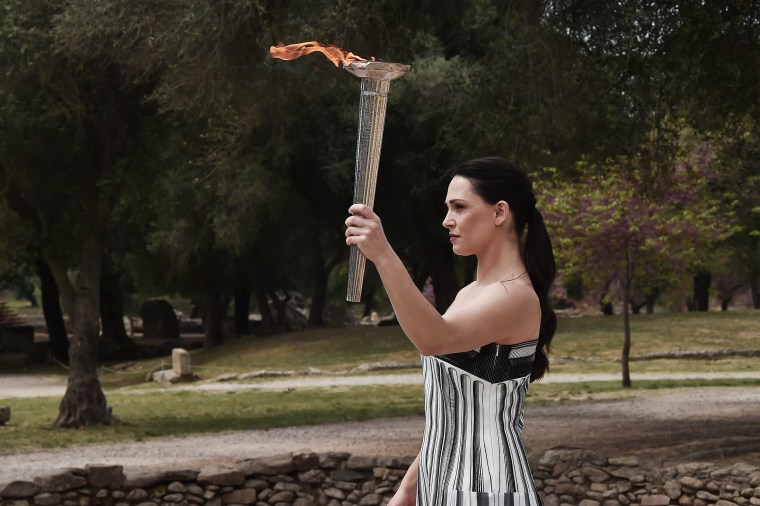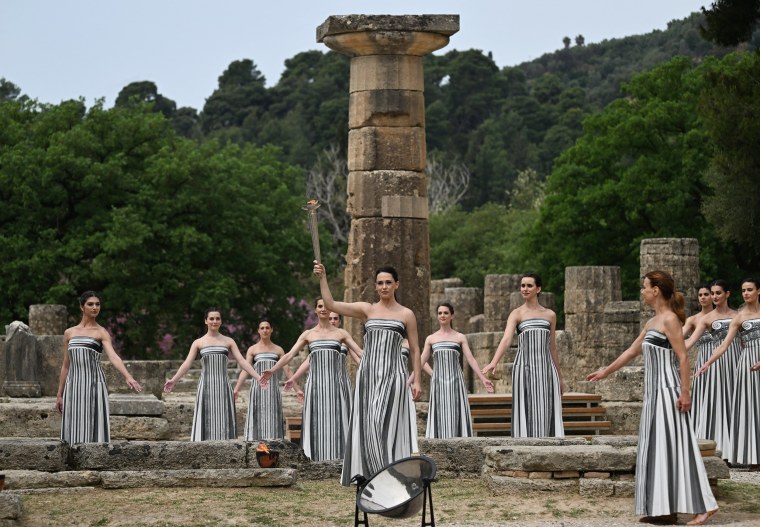The Olympic flame was lit at the birthplace of the Games in Greece on Tuesday in a ceremony rich with ancient traditions that will launch a torch relay culminating in Paris on July 26.
The flame was lit at the site of ancient Olympia and will be carried more than 3,000 miles on its way to the French capital this summer.
In ancient times the flame was lit with the energy of the sun, and it would remain lit in a sanctuary at Olympia known as the Prytaneum.

In keeping with the ancient custom, actor Mary Mina, a “high priestess,” asked the sun god Apollo for help in lighting the flame in the ruins of the temple of Hera, the wife of Zeus and queen of the gods.
The message, organizers say, also remains the same.
“The Olympic flame has been a symbol of peace and friendship among nations since antiquity,” the International Olympics Committee said.
IOC President Thomas Bach said in a speech at the ceremony, "In these difficult times we are living through, with wars and conflicts on the rise, people are fed up with all the hate, the aggression and negative news they are facing day in and day out."
The ceremony was planned to capture the sun’s rays with a parabolic mirror. Cloudy conditions forced Tuesday’s ceremony into plan B: using a pre-lit flame instead of relying on the gods. Organizers will hope that’s the last plan B they need to rely on.
Although it reflects Hellenic traditions dating back thousands of years, the ceremony was first conducted in its current form in 1936, when the Games were held in Berlin under the watch of Adolf Hitler.
The actions are now performed by actors, however, while a dance troupe performs choreography "inspired by ancient times," the IOC said.

The priestess keeper of the fire, known as the Hestiada, then takes the flame in an urn to the ancient stadium at Olympia, where it is given to the first torchbearer along with an olive branch, symbolizing peace.
That first torchbearer will be Olympic rowing champion Stefanos Ntouskos, who will receive the flame at the edge of the ancient Olympic stadium for the start of a relay through Greece.
It will then be handed over to Paris Games organizers in Athens later this month before it departs for France on board a three-masted ship, the Belem.
The Olympic flame will arrive in the Mediterranean port city Marseille on May 8, with up to 150,000 people expected at a ceremony before the French leg of the relay begins.
Marseille, founded by the Greek settlers of Phocaea around 600 B.C., will host the sailing competitions.
The French torch relay will last 68 days. It will culminate with the lighting of the Olympic flame at the Games’ opening ceremony on July 26.
The ancient games date to 776 B.C., and they were hugely popular, carrying on until they were banned in A.D. 393 by Theodosius I, a Christian emperor, who considered the whole business part of a pagan cult.
Much of the modern pageantry didn't happen then — there was no torch relay, for example — while back then Olympic competitors had to perform naked. Wrestling is still an Olympic sport, but competitors are no longer covered in olive oil.
Nor does warfare get in the way, as it did in 480 B.C. when a Persian army invaded, but Greek city-states had a hard time recruiting soldiers because many were more keen on attending or taking part in the games.
Back then women couldn't take part, nor even attend the tournament. One enterprising Spartan princess, Kyniska, exploited a loophole by claiming a victory wreath in 396 and 392 B.C. because she was the owner of a winning chariot.
These days, too many false starts can get a runner disqualified — in ancient Greece you could face corporal punishment.
